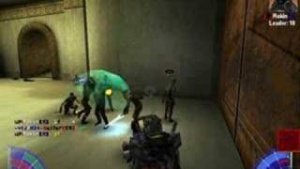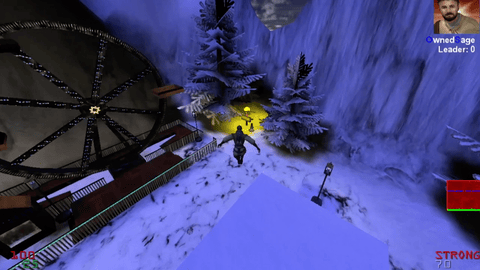Laming Rule

Laming refers to attacking a player who is either unable or unwilling to fight back, either because he is chatting, AFK, lagging out or simply does not want to engage in combat. This sometimes even includes attacking players in the first few seconds after engaging in a duel or attacking them when their saber was knocked down after a block. As this concept became more and more popular and enforced on social and competitive servers, many large clan servers began enforcing a "no laming" rule very strictly, where if a player has their lightsaber off and another player either accidentally or intentionally hits them with their lightsaber, a consequence was dealt, such as being slept, suspended, or even banned.
The laming rule is one of the most common and controversial server rules in Jedi Academy and is an adaptation of a general gaming etiquette that treats gaining an advantage over another player through circumstances that are external to the game as unsporting behavior, be it exploiting the fact that the other player has connectivity issues, is required to pause the game in any way or does not wish to fight on a server that allows for such a possibility.
Although all instances of the laming rule agree that intentionally killing someone who is lagging out or in chat is considered unsporting, individual servers and communities handle the grey areas with varying degrees of severity. Due to this discrepancy it is often wise to check the rules of a server before playing. Most modded FFA servers make this easier for players by editing the Message of The Day to display the important rules, but it is generally advisable to check the webpage of the clan itself for a complete list of rules or immediately ask other players or clan members already on the server.
Controversy
According to some, the no laming rule is one of the fundamental elements of Jedi Academy that has led to the rise of a clan-rich environment by allowing players to focus on communication rather than just gameplay, or making the game easier for new players.

Others believe that the laming rule is a bad one, making Jedi Academy one of the few games with an FFA gametype in which you can not freely kill people, and that it discourages players from playing the actual game, as well as making the game more frustrating to learn for new players.
Some take a balanced stance, where labeling it as "laming" is unnecessary and if a player gets upset for being killed while AFK or other external reasons during a casual FFA, it's their problem to deal with, not the server's. Meanwhile during real events and ladders where points actually matter, it is enforced.
Not all servers enforce a no laming rule, but most do; especially the ones that are affiliated with clans, teams or competitive organizations. The laming rule is widely used on JA+ servers and part of the general ESL ladder rules.
Origin
Although the laming rule is an outgrowth of some aspects of a more universal gaming etiquette, its enforcement outside of competitive settings is almost entirely unique to Jedi Academy. Right from the start, Jedi Outcast FFA servers were frequently used for social gatherings of all kinds; but to make such gatherings possible, the laming rule had to be enforced.
Some compare this term and concept to the term "griefing" used in MMO and survival based games where high level players would hang out in the starting area to kill the new players easily for easy points or just for "fun" and has traditionally been seen as harassment.
It is unclear where the idea of using FFA servers for social purposes originally came from or who first even coined the term "laming". It is assumed that the term is meant to have evolved from calling people "lame" who commit such an act, therefore eventually called the act "laming" and those who do so as "lamers." Two of the people speculated to be behind the idea of a no-laming rule were Calvin and Shroomduck from the clan LiCk, although both deny having invented the word.